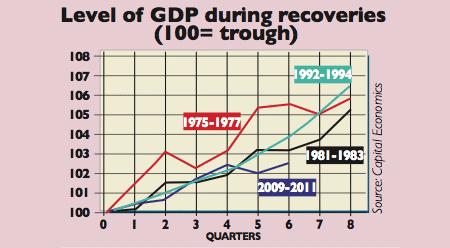Get the latest financial news, insights and expert analysis from our award-winning MoneyWeek team, to help you understand what really matters when it comes to your finances.
You are now subscribed
Your newsletter sign-up was successful
Want to add more newsletters?

Twice daily
MoneyWeek
Get the latest financial news, insights and expert analysis from our award-winning MoneyWeek team, to help you understand what really matters when it comes to your finances.

Four times a week
Look After My Bills
Sign up to our free money-saving newsletter, filled with the latest news and expert advice to help you find the best tips and deals for managing your bills. Start saving today!
The preliminary estimate of the first quarter's GDP showed that the UK economy avoided a double-dip recession with its growth of 0.5%, recovering from the 0.5% fall in 2010's final quarter. This suggests that the economy has flatlined since the third quarter of last year. The Office for National Statistics had said that the heavy snow was behind the October-December dip, so the weather-induced fall has been made up, but no extra growth has been added.
What the commentators said
"We should all be careful about drawing forthright conclusions from one set of data, particularly a preliminary one such as this," Hamish McRae pointed out in The Independent. This first estimate covers only 42% of the data needed to produce a full GDP figure and such estimates are often revised up. The numbers also contrast with some recent survey evidence and the bounce in employment. Deutsche Bank added that a slide in construction and energy production prevented a sharper rebound, but these sectors comprise less than 10% of the economy. Services, which cover 75% of GDP, grew strongly. Indeed, 90% of the economy grew in the first quarter, compared to just 15% in the previous three months.

Still, it seems that the bursting of the credit bubble "has done lasting damage", said Jeremy Warner on Telegraph.co.uk. "The bounce-back capacity the economy has shown after most post-war recessions seems to be sadly lacking this time." Nor will it get any easier from here, as the "full force of the spending cuts" has yet to come. Meanwhile, consumers are rattled by falling real wages. Judging by this week's survey of manufacturing production, the sector remains strong but "may be gradually coming off the boil", according to Howard Archer of IHS Global Insight.
MoneyWeek
Subscribe to MoneyWeek today and get your first six magazine issues absolutely FREE

Sign up to Money Morning
Don't miss the latest investment and personal finances news, market analysis, plus money-saving tips with our free twice-daily newsletter
Don't miss the latest investment and personal finances news, market analysis, plus money-saving tips with our free twice-daily newsletter
Adding to the uncertainty is the extra bank holiday this quarter, thanks to the royal wedding. Retailers in London could get a boost, but with fewer people working the overall impact may be a marginal hit of 0.2%-0.3% to GDP, reckons David Kern of the British Chamber of Commerce. "That, in turn, will skew any third-quarter comparison with a potentially depressed second quarter," said Chris Giles in the Financial Times. It will be some time before the Bank of England can examine data untainted by special effects. On the plus side, it points to the first UK interest-rate hike being pushed further back.
Get the latest financial news, insights and expert analysis from our award-winning MoneyWeek team, to help you understand what really matters when it comes to your finances.
MoneyWeek is written by a team of experienced and award-winning journalists, plus expert columnists. As well as daily digital news and features, MoneyWeek also publishes a weekly magazine, covering investing and personal finance. From share tips, pensions, gold to practical investment tips - we provide a round-up to help you make money and keep it.
-
 Average UK house price reaches £300,000 for first time, Halifax says
Average UK house price reaches £300,000 for first time, Halifax saysWhile the average house price has topped £300k, regional disparities still remain, Halifax finds.
-
 Barings Emerging Europe trust bounces back from Russia woes
Barings Emerging Europe trust bounces back from Russia woesBarings Emerging Europe trust has added the Middle East and Africa to its mandate, delivering a strong recovery, says Max King

